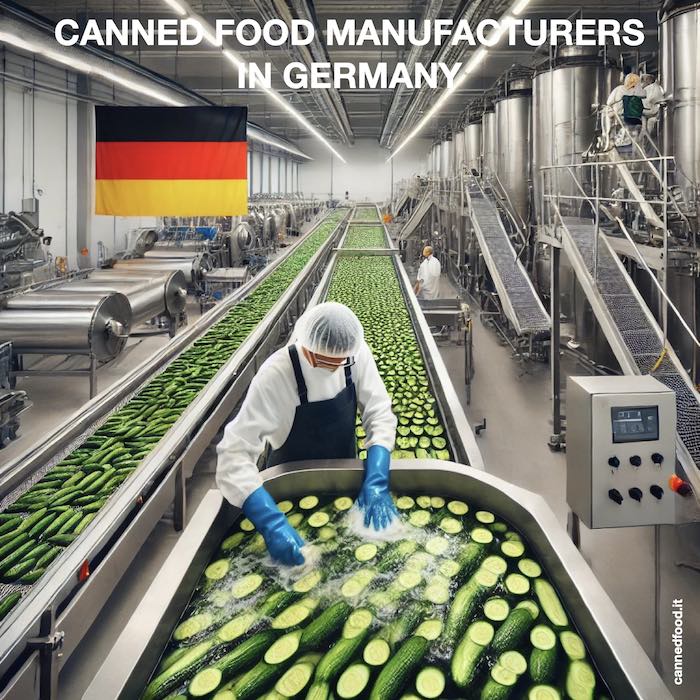 CANNED FOOD PRODUCTION IN GERMANY
CANNED FOOD PRODUCTION IN GERMANY
Germany is one of Europe’s largest producers of preserved foods, spanning a wide range of products like canned fruits and vegetables, pickles, jams, sauces, and ready-to-eat meals. This industry is crucial in Germany for both domestic consumption and export, with German preserved food products being valued for their high quality and adherence to strict European food standards.
Here’s an overview of Germany’s preserved food production industry:
1. Types of Preserved Foods Produced in Germany
- Canned Vegetables and Fruits: Germany produces a wide variety of canned produce, including peas, carrots, tomatoes, and fruits like apples, cherries, and berries.
- Pickled Products: Pickles, sauerkraut, and pickled vegetables are popular and have a long-standing tradition in German cuisine.
- Jams and Jellies: Germany has a large market for fruit-based spreads made with berries, apples, and other fruits. Local regulations require high fruit content, contributing to their reputation for quality.
- Ready-to-Eat and Convenience Foods: Canned soups, stews, and ready-made meals are widely produced, catering to busy lifestyles.
- Dairy and Meat Products: While less common in canned form, some German producers specialize in canned meats, sausages, and dairy-based sauces for both domestic and international markets.
2. Production Practices and Quality Standards
- Strict Regulations: The German food industry operates under rigorous regulations set by the European Union, including hygiene, food safety, and environmental standards. German producers often exceed these requirements, especially in terms of quality control.
- Sustainability Focus: Increasingly, companies are shifting toward sustainable packaging and sourcing methods. Germany has robust recycling programs and incentives to reduce waste in food production, including innovations in recyclable or biodegradable packaging.
- *Preservation Techniques: Alongside traditional canning, Germany uses methods like pasteurization, sterilization, vacuum sealing, and advanced freezing technologies to preserve nutritional value and taste.
3. Consumer Trends
- Health Consciousness: German consumers are increasingly interested in organic, low-sugar, and preservative-free options, leading manufacturers to adapt their production processes to meet this demand.
- Convenience and Ready-to-Eat Foods: Ready meals and convenient, high-quality canned meals are in demand due to changing lifestyles, with more single-person households and a growing preference for easy-to-prepare meals.
- Export Market: German preserved foods are well-regarded worldwide, especially in other EU countries, North America, and parts of Asia. The export market is strong for premium products like jams, pickles, and specialty canned meals.
4. Economic Impact
- The preserved food industry provides employment across Germany in manufacturing, packaging, logistics, and quality control. Additionally, many of these products rely on German-grown produce, supporting the domestic agricultural sector.
5. Research and Innovation
- German companies are at the forefront of research in food preservation, with a focus on extending shelf life without compromising on health and taste. Innovations include preservative-free canned foods, high-pressure preservation techniques, and enhanced flavors.
In summary, the German preserved food industry blends traditional food preservation methods with cutting-edge technology, catering to both the local taste for quality and growing international demand. This industry’s commitment to quality, sustainability, and innovation helps maintain Germany's reputation as a leader in preserved foods.
La Germania è uno dei maggiori produttori di conserve alimentari in Europa e produce un’ampia gamma di prodotti come verdure e frutta in scatola, sottaceti, marmellate, salse e piatti pronti. Il settore delle conserve alimentari è essenziale per il mercato interno e per l’esportazione, poiché i prodotti tedeschi sono apprezzati per l'alta qualità e per il rispetto dei rigorosi standard alimentari europei.
Ecco una panoramica sulla produzione di conserve alimentari in Germania:
1. Tipi di Conserve Alimentari Prodotti in Germania
- Verdure e Frutta in Scatola: La Germania produce molte varietà di verdure e frutta in scatola, tra cui piselli, carote, pomodori, mele, ciliegie e frutti di bosco.
- Prodotti Sottaceto: I sottaceti come cetrioli, cavoli in salamoia (sauerkraut) e verdure sottaceto fanno parte della tradizione culinaria tedesca.
- Marmellate e Confetture: La Germania ha un vasto mercato di confetture e marmellate a base di frutta, spesso caratterizzate da un alto contenuto di frutta e qualità.
- Cibi Pronti e Piatti da Asporto: La produzione di zuppe, stufati e pasti pronti in scatola è diffusa per rispondere alle esigenze di uno stile di vita moderno.
- Prodotti a Base di Carne e Latticini: Meno comuni in forma di conserve, la Germania produce comunque carne, salsicce e salse a base di latticini in scatola per i mercati nazionali ed esteri.
2. Processi Produttivi e Standard di Qualità
- Regolamenti Rigorosi: L'industria alimentare tedesca opera secondo i regolamenti rigidi dell’Unione Europea che impongono standard elevati in termini di igiene, sicurezza alimentare e sostenibilità ambientale. Le aziende tedesche, in molti casi, superano questi requisiti.
- Focus sulla Sostenibilità: Le aziende stanno adottando pratiche di produzione e imballaggi sostenibili, in linea con l’avanzato sistema di riciclaggio tedesco che incentiva la riduzione dei rifiuti.
- Tecniche di Conservazione: Oltre al tradizionale inscatolamento, la Germania utilizza tecniche come la pastorizzazione, la sterilizzazione, il confezionamento sottovuoto e tecnologie di congelamento avanzate, garantendo una maggiore durata e mantenendo il valore nutrizionale.
3. Impatto Economico
- L'industria delle conserve alimentari è una fonte significativa di occupazione in Germania, che va dalla produzione e confezionamento alla logistica e al controllo qualità. Molti di questi prodotti provengono da coltivazioni tedesche, sostenendo anche il settore agricolo.
4. Ricerca e Innovazione
- Le aziende tedesche investono nella ricerca per migliorare le tecniche di conservazione, con particolare attenzione alla durata senza compromessi sulla salute e il gusto. Le innovazioni includono alimenti in scatola senza conservanti, tecniche di conservazione ad alta pressione e sapori migliorati.
In sintesi, l’industria delle conserve alimentari in Germania combina tradizione e innovazione, rispondendo alle esigenze locali di qualità e all’aumento della domanda internazionale. La dedizione a qualità, sostenibilità e innovazione contribuisce a mantenere la Germania ai vertici nel settore delle conserve alimentari.
In Germania, l'equivalente della "visura camerale" italiana si ottiene tramite il Registro delle Imprese (Handelsregister), gestito dalle Camere di Commercio e Industria locali (Industrie- und Handelskammer, IHK) e disponibile online attraverso il portale centrale. In Germania, il Registro delle Imprese è accessibile tramite il portale ufficiale Handelsregister Questo sito permette di consultare le informazioni delle aziende registrate.
If your Company producing canned food in Germany has been not yet added here, you are able to inform us here. Wenn Ihr Unternehmen Konserven herstellt, können Sie uns Ihren Namen für eine mögliche Aufnahme in unser Portal mitteilen.
Back to Top